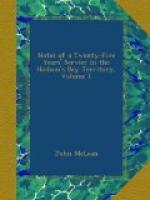In consequence of the frequent shifting of the current, they experience no little difficulty in adjusting their lines, the current being occasionally so strong as to raise them to an angle of forty degrees. Thus, if the lines were too long, and the current not very strong, they would drag on the bottom; if too short, and the current strong, they would be driven up upon the ice. The approach of a storm is indicated, not by any heaving of the ice, but by the strength of the current, and the roaring of the waves under the ice, which is distinctly heard at a considerable distance, and is occasionally increased by the collision of detached masses of broken ice, which, in the earlier part of the season, have been driven under the main crust.
CHAPTER XIX.
REFLECTIONS—PROSPECTS
IN THE SERVICE—DECREASE OF THE
GAME—COMPANY’S
POLICY IN CONSEQUENCE—APPEAL OF THE
INDIANS—MEANS OF
PRESERVING THEM, AND IMPROVING THEIR
CONDITION—ABOLITION
OF THE CHARTER—OBJECTIONS ANSWERED.
The history of my career may serve as a warning to those who may be disposed to enter the Hudson’s Bay Company’s service. They may learn that, from the moment they embark in the Company’s canoes at Lachine, or in their ships at Gravesend, they bid adieu to all that civilized man most values on earth. They bid adieu to their family and friends, probably for ever; for if they should remain long enough to attain the promotion that allows them the privilege of revisiting their native land—a period of from twenty to twenty-five years—what changes does not this life exhibit in a much shorter time? They bid adieu to all the comforts and conveniences of civilized life, to vegetate at some desolate, solitary post, hundreds of miles, perhaps, from any other human habitation, save the wig-wam of the savage; without any other society than that of their own thoughts, or of the two or three humble individuals who share their exile. They bid adieu to all the refinement and cultivation of civilized life, not unfrequently becoming semi-barbarians,—so altered in habits and sentiments, that they not only become attached to savage life, but eventually lose all relish for any other.
I can give good authority for this. The Governor, writing me last year regarding some of my acquaintances who had recently retired, observes—“They are comfortably settled, but apparently at a loss what to do with themselves; and sigh for the Indian country, the squaws, and skins, and savages.”
Such are the rewards the Indian trader may expect;—add to these, in a few cases, the acquisition of some thousands, which, after forty years’ exile, he has neither health, nor strength, nor taste to enjoy. Few instances have occurred of gentlemen retiring with a competency under thirty-five or forty years’ servitude, even in the best days of the trade; what period may be required to attain that object in these times, is a question not easily solved. Up to 1840, one eighty-fifth share had averaged 400l. per annum; since then, however, the dividends have been on the decline, nor are they ever likely to reach the same amount, for several reasons,—the chief of which is the destruction of the fur-bearing animals.




